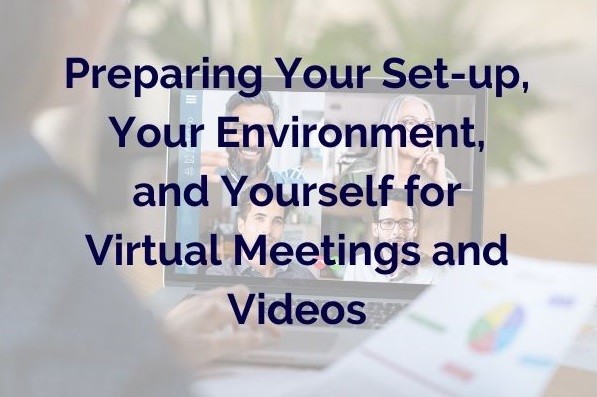
Tips for Being a Great Podcast Guest
 I had the pleasure of being a guest on Christy Tagye’s podcast, Productive Passions. We talked about many aspects of communication and public speaking and the importance of shifting your mindset to set you up for success and greater inner peace as a speaker and in other aspects of your life, and more.
I had the pleasure of being a guest on Christy Tagye’s podcast, Productive Passions. We talked about many aspects of communication and public speaking and the importance of shifting your mindset to set you up for success and greater inner peace as a speaker and in other aspects of your life, and more.
You can listen to it on:
Apple
Podbean
Spotify
Amazon Music
If you’re going to be interviewed for a podcast, here are a few quick tips.
1. When you book the podcast, ask if there are some topics or questions that the host wants to cover. Even if you are provided with questions or topics, know that podcasts can move in a lot of directions, so be ready to talk about a variety of topics.
2. Listen to the podcast to get a feel for the interviewer’s style, the format and tone of the show, and the types of questions the interviewer asks. Some podcast hosts or their producers hold pre-calls to connect with their guests and talk about what they will discuss, but not everyone does this. Listening to several episodes of the podcast and researching the host will help you to feel like you already know them. This is the same advice I give people who are preparing for media interviews.
3. Consider who the audience is and what you want to share that will engage them or help them. Use words and phrases they will understand. If you’re addressing an audience within your industry or that’s on the same level as you in terms of business, you can use more sophisticated language and industry terms. If not, simplify your language and define terms that might be unfamiliar to them.
4. Know that podcasts generally have a more conversational, free-flowing cadence than most news interviews. You should prepare and rehearse responding to questions and speaking about your work and the ideas and stories you want to share, not aiming for verbatim memorization.
5. Don’t get too attached to your content. You might not have the opportunity to share everything you had hoped or planned to. Make peace with that.
6. When the podcast is released, share it with your network. Podcast hosts appreciate that, and this could make other podcast hosts more interested in working with you.
Would you like more tips and articles delivered straight to your inbox?

 This post was written by Lisa Elia, a media trainer, presentation trainer, pitch coach, communication expert, and speaker. She trains clients around the world for media interviews, speeches, internal and external presentations, panels, investor presentations, and promotional videos, and provides executive and team communication coaching.
This post was written by Lisa Elia, a media trainer, presentation trainer, pitch coach, communication expert, and speaker. She trains clients around the world for media interviews, speeches, internal and external presentations, panels, investor presentations, and promotional videos, and provides executive and team communication coaching.
With more than 25 years of experience, Lisa has prepared clients for interviews with TODAY, GMA, The Wall Street Journal, CNN, ESPN, and hundreds of other outlets. Lisa has shared her expertise with national media outlets that include Inc., Entertainment Tonight, E!, and many others. Clients include entrepreneurs, Fortune 500 companies, and everything in between as well as athletes, celebrities, and other public figures.





 Identify points of surface-contact and face-to-face human interaction that are required in your business.
Identify points of surface-contact and face-to-face human interaction that are required in your business. Adjust the tone of your communications to meet people where they are in terms of em
Adjust the tone of your communications to meet people where they are in terms of em
 Video conferencing can be an extremely effective way to hold meetings and deliver presentations. People tend to try to focus solely on the meeting and ignore distractions because their face is zoomed in on, they are probably less likely to be looking at other devices or whispering to someone next to them.
Video conferencing can be an extremely effective way to hold meetings and deliver presentations. People tend to try to focus solely on the meeting and ignore distractions because their face is zoomed in on, they are probably less likely to be looking at other devices or whispering to someone next to them. Somehow, most people look much more serious on video than in person. Greet people warmly with a smile at the start of the video meeting or presentation just as you would if you were welcoming them into your home.
Somehow, most people look much more serious on video than in person. Greet people warmly with a smile at the start of the video meeting or presentation just as you would if you were welcoming them into your home. Since there can be delays in video and sound transmission on video calls, pausing a bit more than usual will give people time to assimilate your message and to respond. Pausing periodically is especially important on group calls where different people may want to speak.
Since there can be delays in video and sound transmission on video calls, pausing a bit more than usual will give people time to assimilate your message and to respond. Pausing periodically is especially important on group calls where different people may want to speak.
 With video calls, it’s as if you are inviting someone (or a group of people) into your office, so it’s important to create a good experience for them.
With video calls, it’s as if you are inviting someone (or a group of people) into your office, so it’s important to create a good experience for them. During in-person meetings, people’s eyes may stray and they may not look directly at you as much as when you’re communicating via video. This is why it’s important to pay extra attention to your personal appearance.
During in-person meetings, people’s eyes may stray and they may not look directly at you as much as when you’re communicating via video. This is why it’s important to pay extra attention to your personal appearance. When working with my clients, I teach them a preparation ritual to help them manage nervousness and focus their minds before presentations, media interviews, and other high-stakes situations. Shifting your energy and preparing to be fully present for your meeting or presentation can help you to perform better and will make a vast difference in the way you feel and are perceived.
When working with my clients, I teach them a preparation ritual to help them manage nervousness and focus their minds before presentations, media interviews, and other high-stakes situations. Shifting your energy and preparing to be fully present for your meeting or presentation can help you to perform better and will make a vast difference in the way you feel and are perceived.

 This article was written by Lisa Elia, a Los Angeles-based media trainer, presentation trainer, communication expert and speaker. In addition to helping clients with crisis communication management and planning, she trains clients for media interviews, speeches, investor presentations and promotional videos. With more than 20 years of experience, Lisa has prepared clients for interviews with Today, Good Morning America, The Wall Street Journal, CNN, ESPN, and hundreds of other outlets. Lisa has been interviewed and shared her expertise with national media outlets that include Inc., Fox News, Entertainment Tonight, E! Entertainment and many others.
This article was written by Lisa Elia, a Los Angeles-based media trainer, presentation trainer, communication expert and speaker. In addition to helping clients with crisis communication management and planning, she trains clients for media interviews, speeches, investor presentations and promotional videos. With more than 20 years of experience, Lisa has prepared clients for interviews with Today, Good Morning America, The Wall Street Journal, CNN, ESPN, and hundreds of other outlets. Lisa has been interviewed and shared her expertise with national media outlets that include Inc., Fox News, Entertainment Tonight, E! Entertainment and many others.
